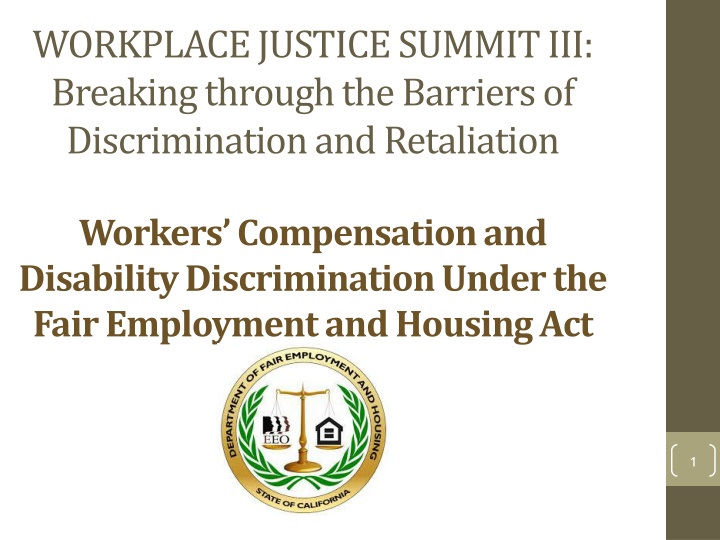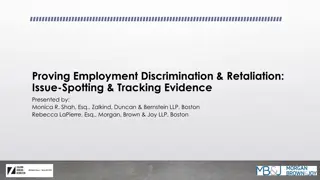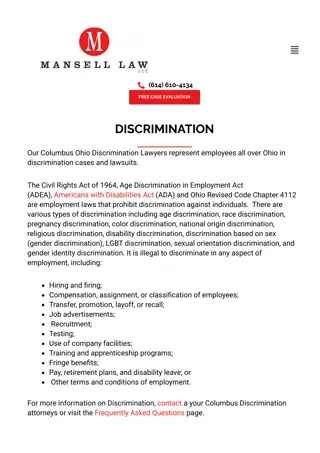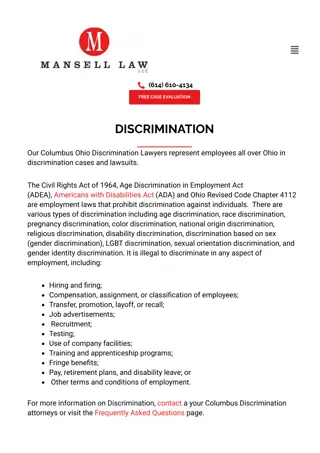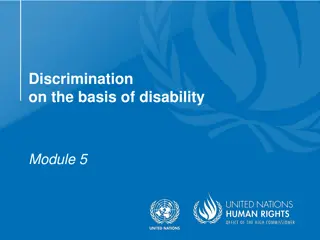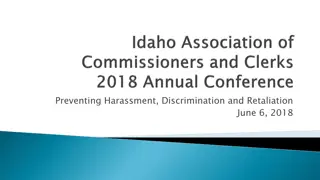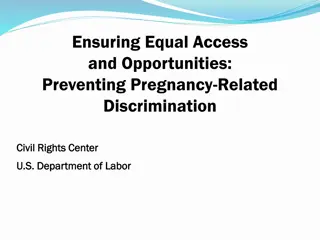Discrimination and Retaliation
Workers Compensation benefits, eligibility, medical care issues, and temporary disability under the Fair Employment and Housing Act. Discover the rights and protections available to workers who suffer job-related injuries or disabilities.
Download Presentation

Please find below an Image/Link to download the presentation.
The content on the website is provided AS IS for your information and personal use only. It may not be sold, licensed, or shared on other websites without obtaining consent from the author.If you encounter any issues during the download, it is possible that the publisher has removed the file from their server.
You are allowed to download the files provided on this website for personal or commercial use, subject to the condition that they are used lawfully. All files are the property of their respective owners.
The content on the website is provided AS IS for your information and personal use only. It may not be sold, licensed, or shared on other websites without obtaining consent from the author.
E N D
Presentation Transcript
WORKPLACE JUSTICE SUMMIT III: Breaking through the Barriers of Discrimination and Retaliation Workers Compensation and Disability Discrimination Under the Fair Employment and Housing Act 1
Workers Compensation Disability Discrimination 2
Workers Comp. Benefits Workers entitled to these benefits when hurt on the job: 1. Medical care 2. Temporary or permanent disability benefits 3. Retraining vouchers 4. Death benefits 3
Workers Comp. Eligibility 1. Don t need to work full time 2. You may be covered even if your employer calls you an independent contractor 3. Don t need to be a legal resident of US 4. Doesn t matter whose fault it was 4
Medical Care Issues 1.Employer chooses doctor unless employee opted out before injury 2.Right to a second opinion from another doctor 5
Temporary Disability The $$$: 2/3s of the wages you lose while recovering Two types: 1. Total: when you can t work at all 2. Partial: when you do some work for your employer 6
Temporary Disability Eligible to start if: 1. You lose pay because you are unable to do your job for >3 days or were hospitalized overnight; and 2. Your employer does not offer other work that pays your usual wages while you recover 7
Temporary Disability Eligible to start if: 1. You lose pay because you are unable to do your job for >3 days or were hospitalized overnight; and 2. Your employer does not offer other work that pays your usual wages while you recover 8
Temporary Disability Benefits stop after: 1. Doctor says you can return to your job; 2. You return to your job or other work at your regular wages; 3. Your condition is not improving or getting worse ( permanent and stationary ) 4. You get 104 weeks of benefits w/in 5 years of injury a. Up to 240 weeks for some injuries including hepatitis, amputations, chronic lung disease 9
Working While Getting TPD Employer not required to offer you work They may offer you work you don t like, so long as you can do it within your work restrictions (e.g. no lifting over 20 lbs) 10
Permanent Disability Benefits If you will never completely recover Doctor determines a rating on how much your disability limits your earning power 100% is very rare Benefit amount based on: Your rating Your wages before injury 11
Disability Discrimination 1. Who is protected? Defining disability and qualified employees. 2. What are they entitled to? Reasonable accommodation. 3. How does that happen? Interactive process. 12
Who is protected? 1. Must be disabled Use legal definition, not the regular meaning 2. Must be able to perform essential job functions (with reasonable accommodation if necessary) without endangering themselves or others 13
When is someone disabled? 1. Actual physical or mental disability 2. Employer knows employee has record or history of disability 3. Employer regards or treats employee as having past, present, or future disability 14
Physical Disability 1. Physiological disease, disorder, condition, cosmetic disfigurement, or anatomical loss; 2. That affects one of the body s systems: neurological, musculoskeletal, cardiovascular, skin, etc.; and 3. Limits a major life activity: physical, mental, social activities, and working Limits = makes achievement difficult 15
Mental Disability 1. Mental or psychological disorder or condition, such as intellectual disability, organic brain syndrome, emotional or mental illness; 2. That limits a major life activity: physical, mental, social activities, and working Limits = makes achievement difficult 16
No Duration Requirement Does not have to be permanent Temporary injury can be disability E.g. a pulled hamstring is: 1. A physiological condition 2. That affects the musculoskeletal system; & 3. Limits the major life activity of walking 17
Perceived Disability Protects employees when the employer thinks the employee is disabled, but the employee isn t They may agree on employee s condition, but disagree on whether it limits a major life activity or requires an accommodation E.g. thrombocytopenia (low platelets) 18
Qualified Employee Must be otherwise qualified to do the job s essential functions Essential functions defined in 2 CCR 11065(e): It s why the job exists Few people at the organization can do it Incumbent hired for ability to do that function Consider employer s judgment, but don t just take their word for it 19
Qualified Employee: cases Correctional officer with arm injury not entitled to accommodation b/c he was unable to do essential functions of using baton and subduing inmates. (Furtado v. SPB (2013) 212 Cal.App.4th 729) Strenuous duties (arrest, chase, etc.) were essential function for police officer in administrative position because the city had too few officers available for those tasks in case of emergency. (Lui v. City and County of San Francisco (2012) 211 Cal.App.4th 962.) 20
Qualified for what? The full job, or something less? Because the LAPD maintained permanent light duty positions that it staffed with police officers who could not perform all of the essential duties of a police officer, the relevant inquiry is whether plaintiff was able to perform the essential duties of the light duty assignment he was given on his return to work and not whether he was able to perform all of the essential duties of a police officer in general. (Cuiellette v. City of Los Angeles (2011) 194 Cal.App.4th 757, 769) 21
Reasonable Accommodation The Fair Employment and Housing Act requires employers to provide reasonable accommodations to qualified employees or applicants with disabilities, unless doing so would cause undue hardship. 22
Reasonable Accommodation Examples: Providing accessible facilities Providing assistive aids/services E.g. screen-reading software for a blind employee Job restructuring Modifying work schedule Modifying employer policies Leave of absence Working from home Reassignment to vacant position 23
Reasonable Accommodation Accommodations that aren t reasonable: Indefinite leave of absence for years Reassignment to a newly created position Lowering a production standard E.g. employees must make 20 widgets per day 24
How does this start? Employee requests a reasonable accommodation E.g. provides a doctor s note saying they cannot climb ladders OR Employer becomes aware of possible need for accommodation through a third party or by observation, or because the employee has exhausted leave under Workers Compensation, CFRA, FMLA, or other leave (2 CCR 11069(b).) E.g. supervisors see an employee fall and get injured 25
Who chooses and how? Employee and employer work together in a timely, good faith, interactive process to determine effective reasonable accommodations (Gov. Code, 12940(n).) Direct communications preferred but not required E.g. employer can talk to employee s doctors or lawyers 26
Interactive Process: Employer s Obligations & Rights Consider the request and either grant it, or reject it and discuss alternatives Medical docs: Employer can ask for reasonable medical documentation when the disability or need for accommodation is not obvious Employer may require more info and second opinions If employer needs clarification of info, it must explain the issues that need clarification, what info is needed, and allow the employee reasonable time to get it 27
Employers Obligations & Rights, Part 2 Must analyze the job and its essential functions (when necessary) Must identify potential accommodations and assess how effective each of them would be Consider employee s preference, but can implement any effective accommodation When considering reassignment, employer may ask employee for info on education & work experience to help find another job 28
Interactive Process: Employee s Obligations & Rights Must provide reasonable medical documentation when disability is not obvious; Don t have to disclose nature of the disability When reassignment is considered, employee must provide info on education & work experience 29
FEHA and Work Comp Findings in Workers Compensation are not always used for FEHA In many workers' compensation cases, a person has a total disability when s/he is unable to do certain tasks, even if those tasks are marginal functions or if s/he could perform them with reasonable accommodation. Thus, a person may be totally disabled for WC purposes and yet still be able to perform a position s essential functions. (Jackson v. County of LA (1997) 60 Cal.App.4th 171, 188, quoting EEOC Enforcement Guidance) 30
FEHA and Work Comp Employers must evaluate an employee s ability to do essential functions independently from the Work Comp rating Injured police officer had light-duty desk job. When PD learned he was 100% disabled in Work Comp, they terminated him because they thought that meant he was not able to work. Court held that was disability discrimination; PD needed to engage in interactive process and accommodate him with desk duty. (Cuiellette v. City of Los Angeles (2011) 194 Cal.App.4th 757) 31
FEHA and Work Comp FEHA acknowledges that doctors aren t perfect [A]n employer cannot slavishly defer to a physician's opinion without first pausing to assess the objective reasonableness of the physician's conclusions. (Gelfo v. Lockheed Martin Corp. (2006) 140 Cal.App.4th 34, 50, fn. 11) 32
FEHA and Work Comp But sometimes, what happened in Work Comp taints the disability case: In WC, officer stipulated to restriction of working in an environment free of emotional stress and strain. In ADA case, court prohibited him from claiming he was qualified to do the essential functions of the job because those involved a stressful environment. (Jackson v. County of Los Angeles (1997) 60 Cal.App.4th 171) 33
Tip for Employees You can accept a transfer to a lower-paying position while still fighting for your right to return to your original position It can be used against you if you don t: On two separate occasions, the County offered Mooney a position within her work restrictions. Mooney rejected the County's offers because the pay and benefits were less than the deputy juvenile correctional officer II position she is unable to perform. ... To the extent Mooney has lacked employment-related income following the denial of her application for disability retirement, it is the product of her inaction, namely, not accepting the alternative placements offered by the County, rather than the result of any dismissal from employment with the County. (Mooney v. County of Orange (2013) 212 Cal.App.4th 865, 876-77.) 34
THANK YOU www.dfeh.ca.gov Jacob Barak Tina Walker Department of Fair Employment and Housing 35
